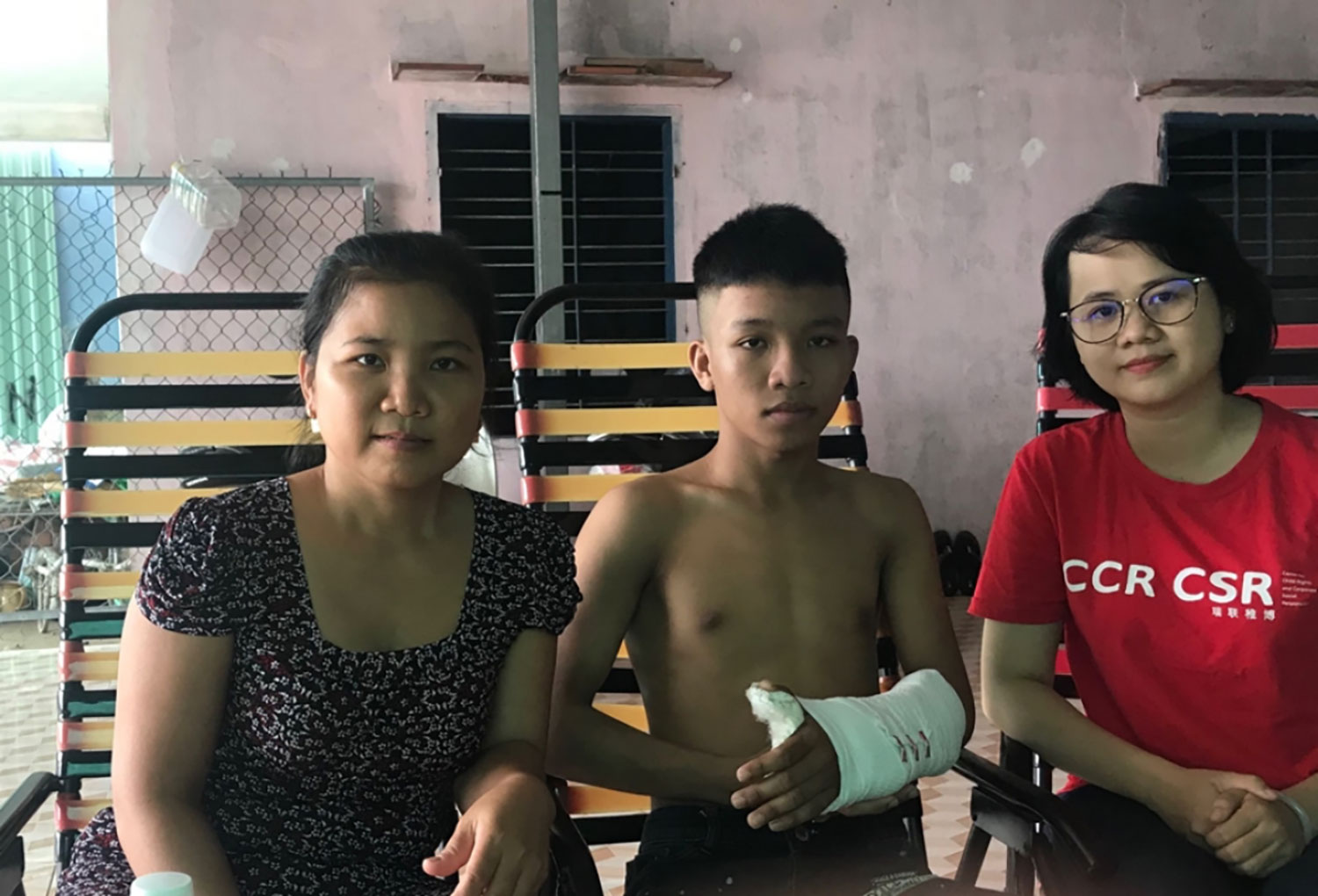
When 17-year-old Trung* quit his job at a furniture factory in January this year to take up an informal job at a fruit processing workshop with slightly higher pay, little could he foresee the difficulties that would lie ahead. His former employer was participating in a youth development programme implemented by The Centre for Child Rights and Business (‘The Centre’, which was known as CCR CSR prior to 2021), whereby the factory would hire out-of-school youth and give them a stable, formal job with decent working conditions that adhered to all the special protection measures that minors are entitled to (limited working hours, no overtime, no hazardous work), as well as ongoing skills training and regular job rotations.
"I didn’t have to work overtime [at the last factory] and the supervisors were also nice to me. I had a chance to gain many skills. However, I decided to leave as the salary did not meet my expectation and the piece rate fluctuated,” Trung said.
Trung's new job packing dragon fruit on the other hand paid more on paper than his previous job, but it came with several red flags:
"When working at the dragon fruit company, they did not sign a contract with me, nor did they check my age. But the salary was higher than in the previous factory. As the working time was from 8:30 am to 9:00 pm or 10:00 pm, I sometimes felt tired and got minor injuries when using the tools,” Trung recalled.
The job provided no social security whatsoever. But being inexperienced, Trung paid little attention to the red flags and focused instead on salary.
A horrific accident on June 18 however, taught him the hardest lesson of his life. Exhausted from another long day at the fruit workshop, Trung was riding his uncle’s motorbike home when he collided with another motorbike driver.
“The accident happened on the way back home from the Dragon fruit factory at around 9:00 pm. There was no support from the Dragon fruit company," he remembers.
His arm was left partially severed, requiring emergency surgery and ongoing physiotherapy with a price tag of VND 25,000,000 (approx. $1075). As he didn’t want to claim compensation from the other driver, Trung's family was left shouldering the medical fees themselves.
The timing of his accident could not have come at a worse time. Due to the COVID-19 pandemic, Trung's mother was barely making any money. Before the pandemic, she would sell soft drinks and coffee in her neighbourhood and earn up to VND 5,000,000 (approx. $215) a month. But now, business had all but dried up. Trung's father worked in construction in Ho Chi Minh City and also lacked a stable income and none of his family members had any kind of social security protection to speak of. The family typically needed around around VND 4,000,000 to VND 5,000,000 a month to get by, so even before the pandemic and the accident, there was very little left over for savings.

The Centre visited Trung (centre) at his home to check up on his situation and progress.
Left without a choice, the family took out loans which they must now repay each month with 10% interest. In an instant, his family was thrown into extreme financial difficulty. When The Centre became aware of Trung's situation we deployed our COVID-19 emergency fund to help Trung and his family get through this difficult time. The Centre’s COVID-19 emergency fund is funded by Seidensticker Group and Tigha to mitigate urgent child rights challenges in supply chains brought on specifically by the COVID-19 pandemic. The fund exists to support young workers, parent workers and children formerly in child labour situations who are currently experiencing extreme hardship. Once the emergency funding is used up, The Centre hopes to continue supporting him until he finds his footing.
Although Trung's situation is particularly unfortunate due to his injury, many workers in supply chains across Asia are in extreme hardship during this pandemic and are struggling just to pay for the most basic life necessities. The pandemic has laid bare the fact that workers are not only at the very bottom of supply chains, they are largely unprotected from the shocks of crises. Any reduction in their income may see themselves and their families flung into extreme hardship and uncertainty almost overnight.
The Centre’s COVID-19 Resource Hub is tracking the vulnerabilities and extreme challenges faced by workers connected to global supply chains. We continue to work across Asia to strengthen the resilience of workers and their families amid the global pandemic.
"Now I have no direction for my future. I hope that my left hand can recover so that I can work again," Trung said.
Contact us to discuss how The Centre can support workers in your supply chain during the COVID-19 pandemic and beyond.
By using this website, you agree to our use of cookies. We use cookies to provide you with a great experience and to help our website run effectively.